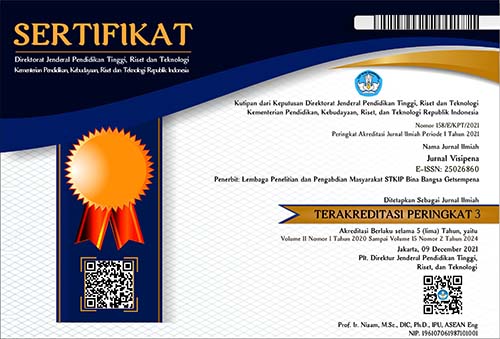DEVELOPMENT OF A LOCAL WISDOM-BASED ANIMATED VIDEO FOR THE ENGLISH LEARNING OF SECONDARY-LEVEL STUDENTS’ IN SABANG CITY, ACEH PROVINCE
Abstract
The use of video as learning media in the digital age has been prevalent. A large body of literature has shown its effectiveness in the English as a Foreign Language (EFL) classrooms as it includes audio-visuals that makes the learning appealing. However, there is very limited research devoted to developing a video animation based on a local wisdom. Hence, this study aims to develop a video animation that includes local wisdom for teaching English to secondary school students. This research employed a Research and Development method which include: (1) problem analysis, (2) data collection, (3) product design, (4) validation, (5) revision, (6) product trial (7) final product revision. The data collection instruments used are validation sheets, questionnaire and observation sheet. The research subjects were 25 students at Grade VIII of SMPN 7 and SMPN 8 in Sabang City. The observation results showed a lack of multimedia used in the English learning. The validation results by media and material experts indicated that the animated video is very appropriate in terms of the design, material, and language with validation scores of 96.66%, 97.77%, and 96.36%. Meanwhile, the questionnaire results also uncovered that the animated video is favored by the students.
Downloads
References
Andrean, C., Sofian., Rezeki, Y.S. (2019). Improving Students’ Vocabulary Mastery by Using Animated Video. Undergraduate Thesis.
Anggeraini, Y., Faridi, A., Mujiyanto, J., & Bharati, D. A. L. (2019). Literasi Digital: Dampak dan Tantangan Dalam Pembelajaran Bahasa. Seminar Nasional Pascasarjana UNNES, 386–389.
Borg, W.R. and ve Gall, D. (1983). Educational Research. Longman, New York.
Erman, E., & Wakhidah, N. (2024). Connecting Students to Local Wisdom to Learn Science for Sustainable Development Goals: A Conceptual Framework. KnE Social Sciences, 9(13), 1364–1374. https://doi.org/10.18502/kss.v9i13.16076
Habiby, W.N. (2017). Statistika Pendidikan. Sukarta: Muhammadiyah University Press.
Hikmah, S.D. (2012). The Use of Animation Video for Vocabulary Mastery. ENGLISH EDUCATION: English Journal for Teaching and Learning. 9(2). 151-162. https://doi.org/10.24952/ee.v9i02.4804
Khalidiyah. (2015). The Use of Animated Video in Improving Students' Reading Skill (A Quasi-Experimental Study of Seventh Grade Students at A Junior High School in Jalancagak, Subang). Journal of English and Education, 3(1), 59-79. https://ejournal.upi.edu/index.php/L-E/article/download/4611/3210
Khumairah, A.R., Korompot, C.A., Sultan, S. (2023). Utilizing Animated to Improve Listening Abilities in English Language Instruction. Research and Innovation in Applied Linguistics. 1(2), 96-118. https://doi.org/10.31963/rial-ej.v1i2.4258
Maskhuroh, K. (2022). The Use of Animation Video in Teaching Speaking Skill of Tenth Grade Students at Al-Ma’muroh dormitory Study Club In Academic Year 2021/2022”. Undergraduate Thesis. http://repository.library-iaida.ac.id/id/eprint/113/1/KHUMAIDAH%20MASKHUROH%2018112210035%20SKRIPSI.pdf
Mazmurrini, E., Aji., M.P.P., & Suhartono. (2023). The Effect of Using Animation Video on Students’ Writing Skills. Proceedings of 9th ELTT Conference. 9. 104-110. ISSN: 2579-437X.
Melyana R Pugu, Noneng Nurhayani, & Farida Asy'ari. (2024). Implementation of Local Wisdom In Learning In Schools Around Rural Areas. Jurnal Ilmu Pendidikan Dan Kearifan Lokal, 4(2), 105–116. Retrieved from https://www.jipkl.com/index.php/JIPKL/article/view/111
Olii, K., & Nurwati, A. (2022). Teacher strategy in using animated videos in learning English . Journal of English Teaching and Linguistic Issues (JETLI), 1(3), 104–113. https://doi.org/10.58194/jetli.v1i3.88
Paradillah, W., Yunus, M. & Hadijah, H. (2023). The Use of Animation Video to Improve Students’ Speaking Skill. Karya Ilmiah Mahasiswa - Kima. 2(2). e-ISSN: 296-5640. https://jurnal.fs.umi.ac.id/index.php/KIMA/issue/view/12
Pujiani, Tri & Harsiwi, Windy & Almustaflikhah, Neilia. (2022). The Use of Animation Video as Online Learning Media to Teach English for Young Learners. Acitya: Journal of Teaching and Education. 4. 244-251. https://doi.org /10.30650/ajte.v4i1.3220.
Rahman, A., Al-Qasri, S., Ofara, W. (2023). Exploring Digital Literacy Practices in English Language Learning for Secondary Level Students. 11(4). Journal of Languages and Language Teaching. https://doi.org/10.33394/jollt.v11i4.8939
Rukajat, A. (2018). Pendekatan Penelitian Kuantitif: Quantitative Research Approach. Cetakan pertama. Yogyakarta: Deepublish.
Siregar, M.H. (2021). The Utilization of Animation Video in Narrative Text Writing Class: An Exploration of Students’ Perceptions. Journal Vision. 17(2). 76-88. http://dx.doi.org/10.30829/vis.v17i2.1154
Sugiyono. (2019). Metode Penelitian Kuantitatif, Kualitatif, dan R&D. Bandung: Alphabet.
Surani, D., Umalihayati., Septiyani, R.D., Holilah. (2023). Integrating Digital Literacy in English for Specific Purposes Instruction via English for Law E-Module. Journal of English Teaching and Learning Issues, 6(1), 57–64. http://dx.doi.org/10.21043/jetli.v6i1.19293
Suri, M., Fitriliana, F., Nelliraharti, N. (2024). Bimbingan Literasi Digital Dalam Menyaring Serbuan Informasi Bagi Generasi Muda Di Smkn 1 Kota Sabang. Jurnal Pengabdian Kepada Masyarakat Bidang Pendidikan. 6(1). https://jurnal.uui.ac.id/index.php/jpkmes/article/view/3853
Zuhra, C. M., Daud, M., Faizah, C., Fitria, N., & Yanti, Y. (2024). Literasi Digital Berbasis Kearifan Lokal Sabang dalam Pembelajaran Bahasa Inggris. MEGA PRESS NUSANTARA.




















